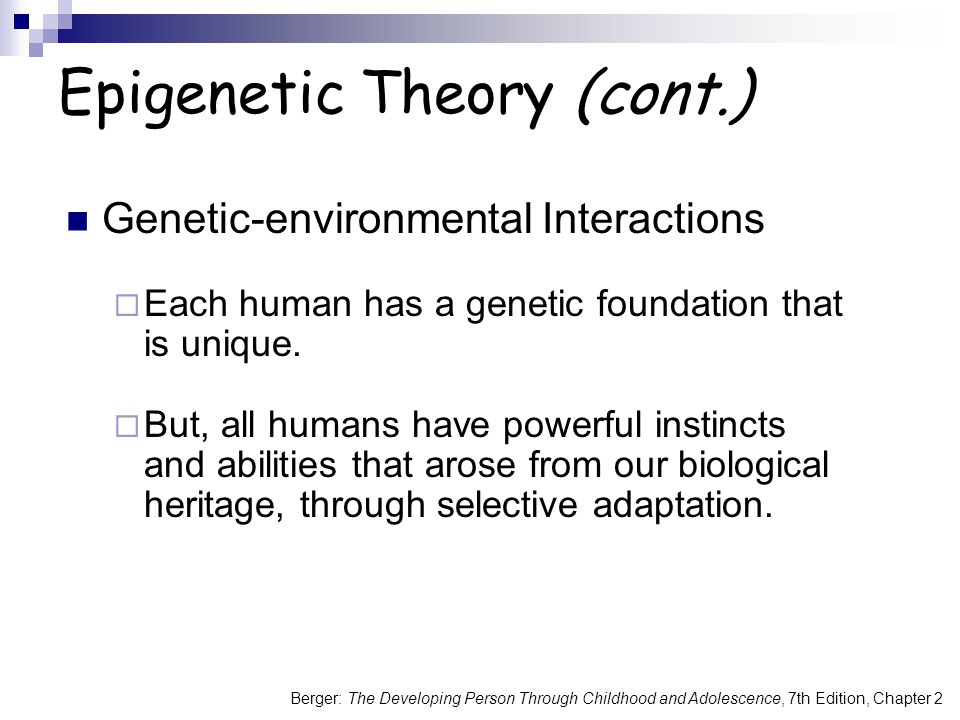Moreover the demethylation of the paternal genome is much faster than that of the maternal genome and by the end of the zygotic stage the genome-wide methylation level in male pronuclei is already lower. The DNA methylation landscape of human early embryos DNA methylation is a crucial element in the epigenetic regulation of mammalian embryonic developmentWe show that the major wave of genome-wide demethylation is complete at the 2-cell stage contrary to previous observations in mice.
 Theories Of Development Ppt Video Online Download
Theories Of Development Ppt Video Online Download
Epigenetics isthe study of how the environmentand other factors can change the way that genesare expressed.
Epigenetic theory of development. Epigenetic theory builds on Ethnology which is the study of behavior as it relates to the evolution survival of a species. Development before birth including gametogenesis embryogenesis and fetal development is the process of body development from the gametes are formed to eventually combine into a zygote to when the fully developed organism exits the uterusEpigenetic processes are vital to fetal development due to the need to differentiate from a single cell to a variety of cell types that are arranged in. In medical practise however a.
Psychoanalyst Erik Eriksons stages of psychosocial development theorize a model of human psychological growth made up of eight stages that cover the entire lifespan from birth to old age. Epigenetic concept requires if consistently applied to organisms whose early development takes place within a womb a transmission of information via the specific maternal environment created. Epigenetics meanwhile means very different things to different researchers.
15 The causal mechanisms involved in the relationships between epigenetic marks how the brain develops and functions. Epigenetic psychobiological systems perspective is an emergent theory that views development as a product of interaction between biological and environmental forces. Erik EriksonJ Theory ofldentity Development Erik Erikson 1902-1994 the developmental sequence of the well-known eight stages of man.
The traits that are most useful will become more frequent within individuals making the survival of the species more likely. Thus he called it the Ego Psychology for it enables to identify it in each stage the life of a person. Movement upward along the diagonal axis represents normal development and shows the successive differen-tiation of the original undifferentiated structure and thus represents increasingly more ma-.
Epigenetic theory is a principle expounded on by psychologist Erik Erikson that claims that personality develops in eight predetermined stages. From a biological point of view this information is equal to genetic and cyto-plasmic information. Large parts of epigenetic research in particular in medical epigenetics consist of studies on correlations not causation.
The increased knowledge of epigenetics combined with rise of technologies such as CRISPRCas9 gene editing and next-generation sequencing in recent years allows us to better understand the interplay between epigenetic change gene regulation and human diseases and will lead to the development of new approaches for molecular diagnosis and. Other studies examine the involvement of epigenetic factors in gene regulation processes with the genome as first cause. Each stage is defined by a central crisis that the individual must grapple with to move on to the next stage.
Ones family upbringing builds up on these stages. While epigenetic changes do not alter the sequence of a persons genetic code they can. Eriksons theory outlined eight stages of personality development arguing that each stage depended on.
This theory is known as the Developmental Origins of Health and Disease DOHaD in which epigenetic memories involving DNA. But during the past 50 years the meaning of the term epigenetics has itself undergone an evolution that parallels our dramatically increased knowledge of the molecular mechanisms underlying regulation of gene expression in eukaryotes. 2 Epigenetic regulation in the brain can also influence a variety of complex neural functions such as memory formation learning and the calibration of stress response circuitry.
These environmental factors during early childhood and adolescence can cause changes in expression of genes conferring risk of mental health and chronic physical conditions. This theory draws heavily upon some of Sigmund Freuds theories concerning the superego ego and id. AN EPIGENETIC THEORY OF EMOTIONS IN EARLY DEVELOPMENT 317 Freudian instinct theory and object-relations development theory are based on the proposition that critical periods are defined more saliently when epigenetic elements of the subject are considered along with corresponding social responses of the environment.
PS An aspect of evolution in which over generations genes for. In the Epigenetics theory as explained by Erikson he believed that childhood is very important in ones Stages of Personal Growth. A number of epidemiological studies have suggested that environmental stresses such as malnutrition during the fetal period can induce development of metabolic disorders such as obesity type 2 diabetes and hypertension and psychiatric disorders in later life.
The history of epigenetics is linked with the study of evolution and development. For example how tall they could eventually become or the kind of temperament they could have. It includes both the genetic.
Recent studies have provided insights into epigenetic regulation of developmental pathways in response to a range of external environmental factors Dolinoy Weidman Jirtle 2007. Brain development in mammals requires a precisely coordinated sequence of gene regulation events some of which are epigenetic in order to produce and spatially locate neurons and glial cells. The genes children inherit from their biological parents provide information that guides their development.
Epigenetics explains how early experiences can have lifelong impacts.